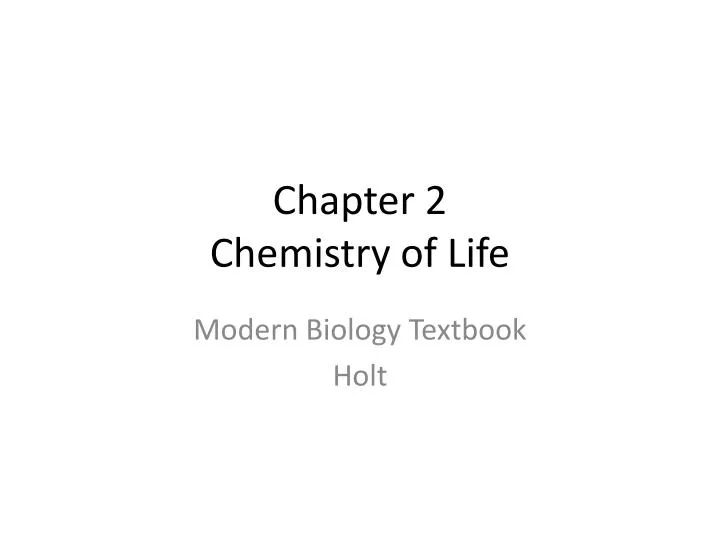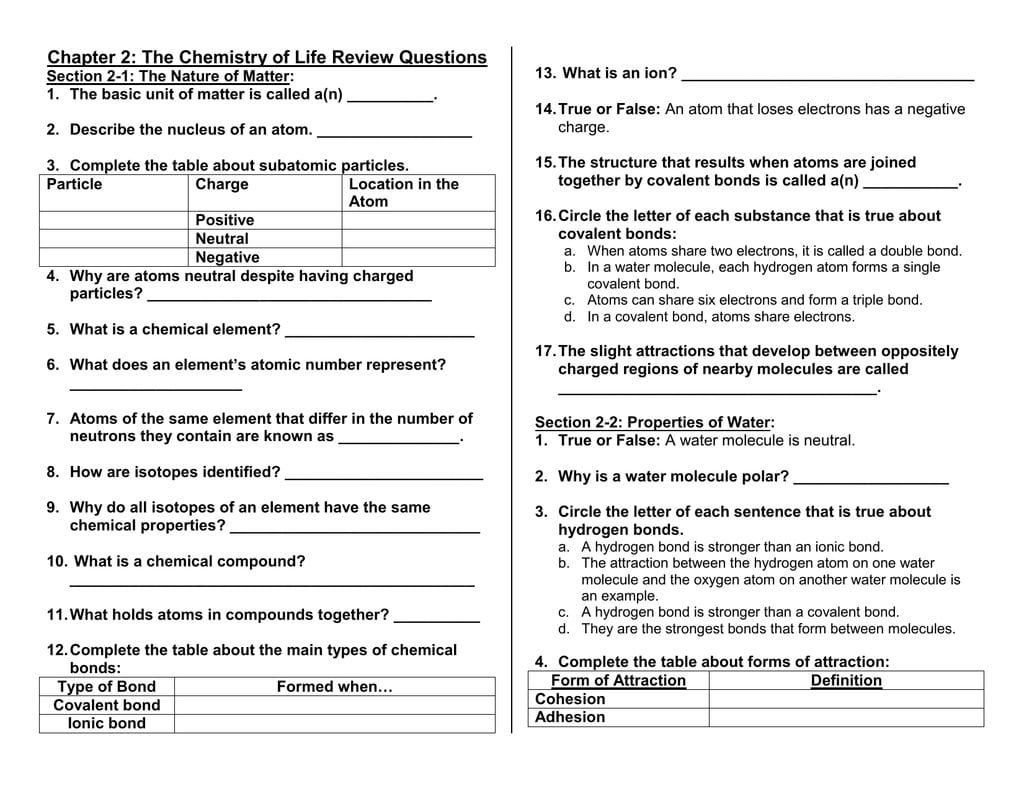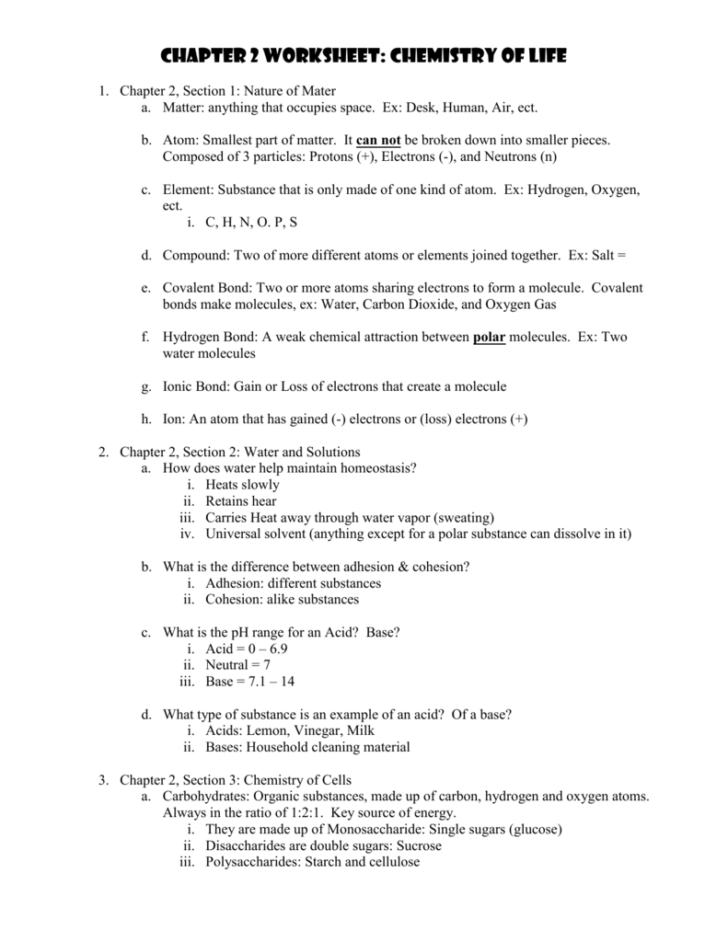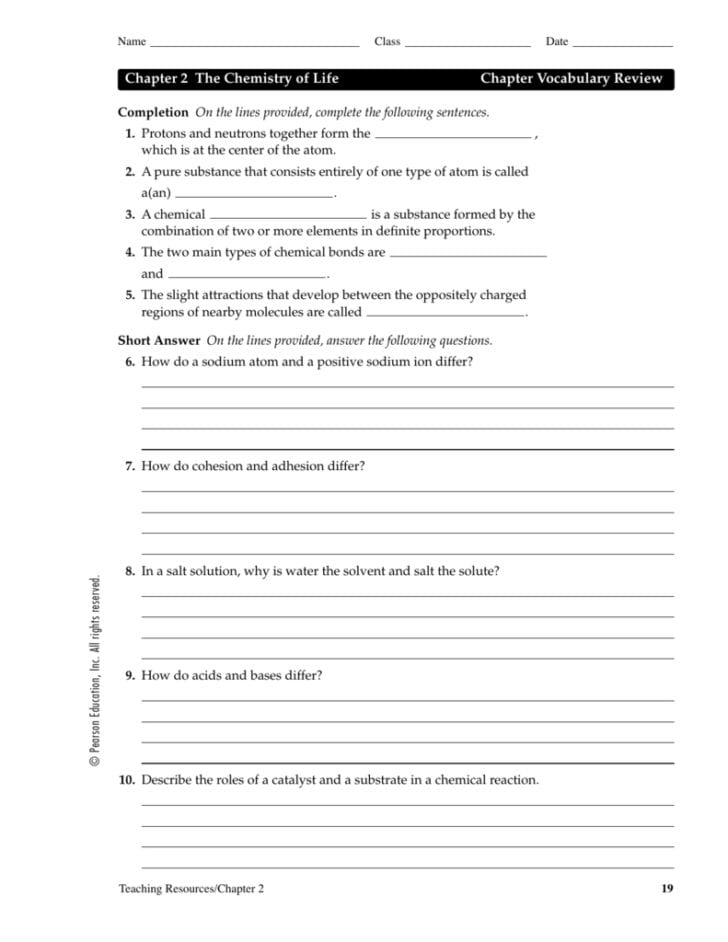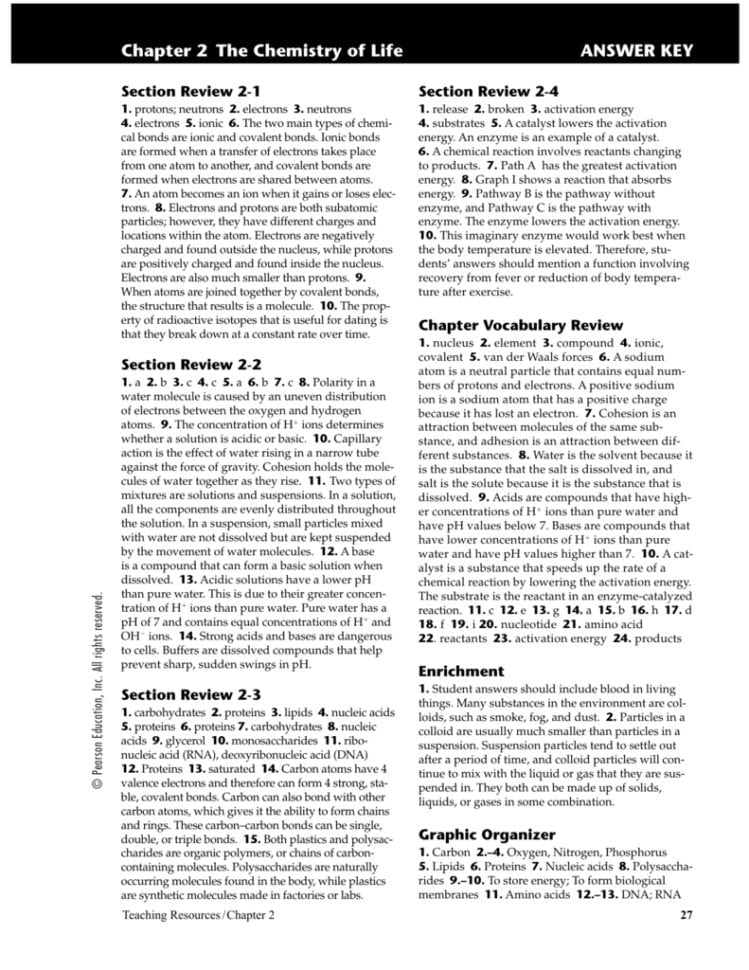Chapter 2 Chemistry Of Life
Chapter 2 Chemistry Of Life - Web key concepts living organisms are made from chemical compounds, and everything they do must obey all the laws of chemistry and physics. The elements carbon, hydrogen, nitrogen, oxygen, sulfur, and phosphorus. Click the card to flip 👆 the subatomic particles that make up atoms. 2.1 the building blocks of molecules. Web unit 1 intro to biology unit 2 chemistry of life unit 3 water, acids, and bases unit 4 properties of carbon unit 5 macromolecules unit 6 elements of life unit 7 energy and. Figure 2.1 foods such as bread, fruit, and cheese are rich sources of biological macromolecules. Introduction to the chemistry of life. To understand organisms, one must have a basic appreciation of the principles of chemistry…
The elements carbon, hydrogen, nitrogen, oxygen, sulfur, and phosphorus. 2.1 the building blocks of molecules. To understand organisms, one must have a basic appreciation of the principles of chemistry… Web unit 1 intro to biology unit 2 chemistry of life unit 3 water, acids, and bases unit 4 properties of carbon unit 5 macromolecules unit 6 elements of life unit 7 energy and. Introduction to the chemistry of life. Web key concepts living organisms are made from chemical compounds, and everything they do must obey all the laws of chemistry and physics. Figure 2.1 foods such as bread, fruit, and cheese are rich sources of biological macromolecules. Click the card to flip 👆 the subatomic particles that make up atoms.
The elements carbon, hydrogen, nitrogen, oxygen, sulfur, and phosphorus. To understand organisms, one must have a basic appreciation of the principles of chemistry… Figure 2.1 foods such as bread, fruit, and cheese are rich sources of biological macromolecules. Web key concepts living organisms are made from chemical compounds, and everything they do must obey all the laws of chemistry and physics. Click the card to flip 👆 the subatomic particles that make up atoms. Introduction to the chemistry of life. 2.1 the building blocks of molecules. Web unit 1 intro to biology unit 2 chemistry of life unit 3 water, acids, and bases unit 4 properties of carbon unit 5 macromolecules unit 6 elements of life unit 7 energy and.
PPT Chapter 2 Chemistry of Life PowerPoint Presentation, free
Figure 2.1 foods such as bread, fruit, and cheese are rich sources of biological macromolecules. The elements carbon, hydrogen, nitrogen, oxygen, sulfur, and phosphorus. Click the card to flip 👆 the subatomic particles that make up atoms. Introduction to the chemistry of life. Web key concepts living organisms are made from chemical compounds, and everything they do must obey all.
Chapter 2 The Chemistry Of Life Review Questions —
Introduction to the chemistry of life. Click the card to flip 👆 the subatomic particles that make up atoms. The elements carbon, hydrogen, nitrogen, oxygen, sulfur, and phosphorus. Figure 2.1 foods such as bread, fruit, and cheese are rich sources of biological macromolecules. Web key concepts living organisms are made from chemical compounds, and everything they do must obey all.
PPT Chapter 2 Notes The Chemistry of Life PowerPoint Presentation
The elements carbon, hydrogen, nitrogen, oxygen, sulfur, and phosphorus. 2.1 the building blocks of molecules. To understand organisms, one must have a basic appreciation of the principles of chemistry… Web unit 1 intro to biology unit 2 chemistry of life unit 3 water, acids, and bases unit 4 properties of carbon unit 5 macromolecules unit 6 elements of life unit.
Chapter 2 The Chemistry Of Life Worksheet Answers —
Introduction to the chemistry of life. Web unit 1 intro to biology unit 2 chemistry of life unit 3 water, acids, and bases unit 4 properties of carbon unit 5 macromolecules unit 6 elements of life unit 7 energy and. Web key concepts living organisms are made from chemical compounds, and everything they do must obey all the laws of.
Biology Chapter 2 The Chemistry Of Life Worksheet Answers —
Web key concepts living organisms are made from chemical compounds, and everything they do must obey all the laws of chemistry and physics. Web unit 1 intro to biology unit 2 chemistry of life unit 3 water, acids, and bases unit 4 properties of carbon unit 5 macromolecules unit 6 elements of life unit 7 energy and. Click the card.
chapter 2 The chemistry of life Crossword WordMint
2.1 the building blocks of molecules. The elements carbon, hydrogen, nitrogen, oxygen, sulfur, and phosphorus. Figure 2.1 foods such as bread, fruit, and cheese are rich sources of biological macromolecules. Click the card to flip 👆 the subatomic particles that make up atoms. Web unit 1 intro to biology unit 2 chemistry of life unit 3 water, acids, and bases.
Biology Chapter 2 The Chemistry Of Life Worksheet Answers —
Figure 2.1 foods such as bread, fruit, and cheese are rich sources of biological macromolecules. 2.1 the building blocks of molecules. Introduction to the chemistry of life. Web key concepts living organisms are made from chemical compounds, and everything they do must obey all the laws of chemistry and physics. The elements carbon, hydrogen, nitrogen, oxygen, sulfur, and phosphorus.
chapter 2 The chemistry of life Crossword WordMint
Web unit 1 intro to biology unit 2 chemistry of life unit 3 water, acids, and bases unit 4 properties of carbon unit 5 macromolecules unit 6 elements of life unit 7 energy and. The elements carbon, hydrogen, nitrogen, oxygen, sulfur, and phosphorus. Web key concepts living organisms are made from chemical compounds, and everything they do must obey all.
PPT Chapter 2 Chemistry of Life PowerPoint Presentation, free
Web key concepts living organisms are made from chemical compounds, and everything they do must obey all the laws of chemistry and physics. Introduction to the chemistry of life. To understand organisms, one must have a basic appreciation of the principles of chemistry… Click the card to flip 👆 the subatomic particles that make up atoms. Figure 2.1 foods such.
Chapter 2 Chemistry of Life
The elements carbon, hydrogen, nitrogen, oxygen, sulfur, and phosphorus. 2.1 the building blocks of molecules. Figure 2.1 foods such as bread, fruit, and cheese are rich sources of biological macromolecules. Web unit 1 intro to biology unit 2 chemistry of life unit 3 water, acids, and bases unit 4 properties of carbon unit 5 macromolecules unit 6 elements of life.
Web Unit 1 Intro To Biology Unit 2 Chemistry Of Life Unit 3 Water, Acids, And Bases Unit 4 Properties Of Carbon Unit 5 Macromolecules Unit 6 Elements Of Life Unit 7 Energy And.
The elements carbon, hydrogen, nitrogen, oxygen, sulfur, and phosphorus. Web key concepts living organisms are made from chemical compounds, and everything they do must obey all the laws of chemistry and physics. Click the card to flip 👆 the subatomic particles that make up atoms. Figure 2.1 foods such as bread, fruit, and cheese are rich sources of biological macromolecules.
Introduction To The Chemistry Of Life.
To understand organisms, one must have a basic appreciation of the principles of chemistry… 2.1 the building blocks of molecules.
